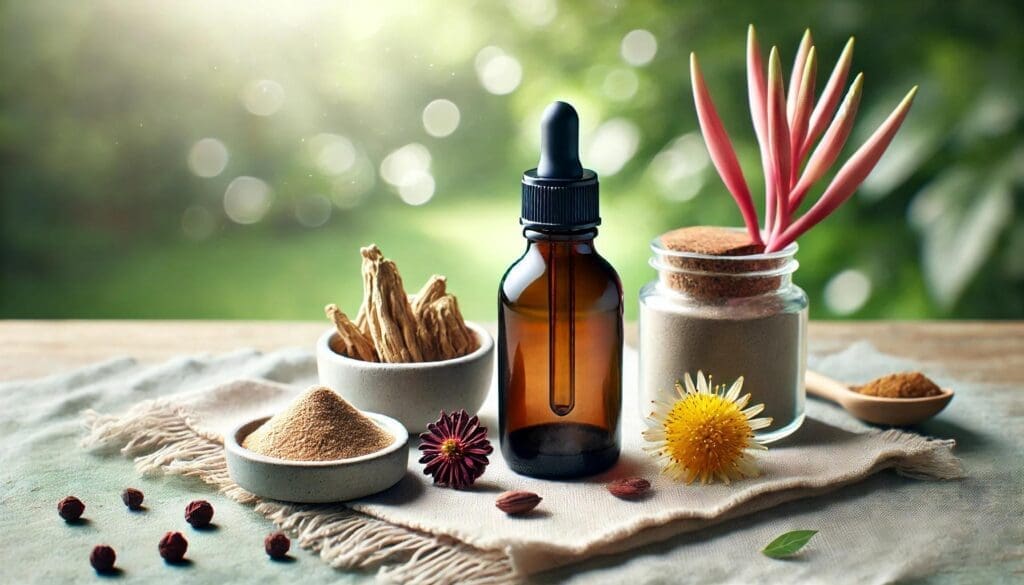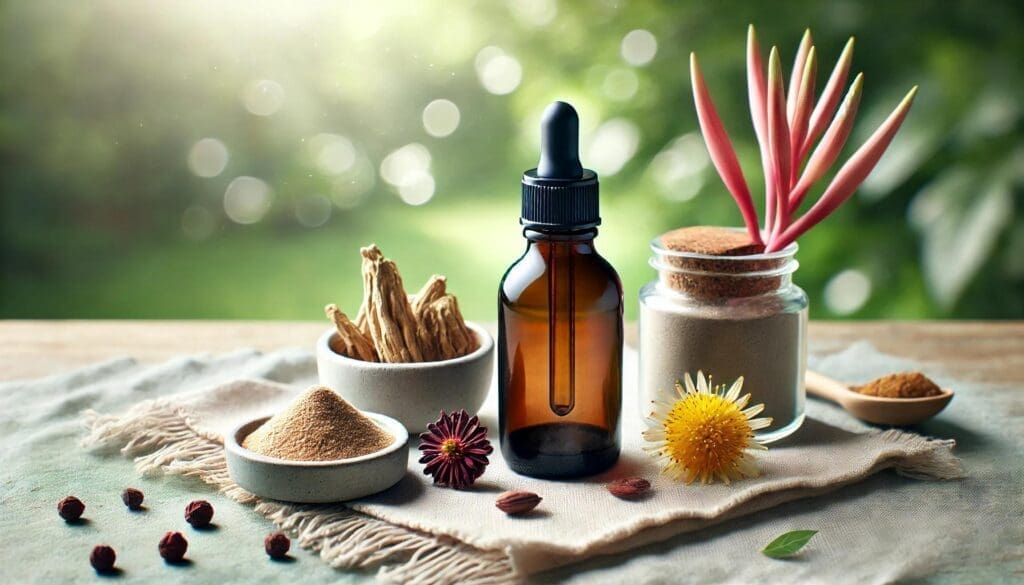Perimenopause can be a challenging time. It’s a transitional phase that can bring a host of physical and emotional changes.
Adaptogens, nature’s stress relievers, may offer some relief. These unique herbs have been used for centuries in traditional medicine.
But what exactly are adaptogens? And how can they help with perimenopause symptoms?
Adaptogens are plants known for their ability to help the body adapt to stress. They work by supporting and balancing our hormonal system.
In the context of perimenopause, adaptogens can potentially ease symptoms like hot flashes, mood swings, and fatigue. They do this by helping to regulate the body’s stress response, which is often out of balance during this time.
This article will delve into the world of adaptogens for perimenopause. We’ll explore their historical use, how they work, and the scientific evidence supporting their benefits.
We’ll also provide practical advice on how to incorporate these powerful plants into your lifestyle. Our goal is to empower you with knowledge and tools to navigate perimenopause with grace and resilience.
So, let’s embark on this journey together, harnessing the power of adaptogens to ease perimenopause symptoms.
You May Also Like: Exploring the Benefits of Adaptogen Drops
Understanding Perimenopause and Its Challenges
Perimenopause marks the years leading up to menopause. Typically, it begins in a woman’s 40s but can start earlier. This phase can last several years, with varying intensity and duration.
The body’s production of estrogen and progesterone fluctuates during perimenopause. These hormonal shifts can result in a wide array of symptoms. Many women experience changes well before they officially reach menopause.
Perimenopause symptoms often impact daily life. Common signs include:
- Irregular periods
- Hot flashes
- Night sweats
- Mood swings
- Sleep disturbances
Fatigue and weight gain are also frequent complaints. These symptoms can affect women’s physical health, mental well-being, and relationships. Coping with such changes can be overwhelming without proper support.
Hormonal fluctuations can even amplify stress and anxiety. During this time, women’s bodies are more sensitive to everyday stressors. The combination of hormonal imbalance and external stressors intensifies the challenges faced.
Navigating perimenopause is a unique journey for each woman. Some manage symptoms with minimal disruption, while others face significant challenges. Knowing the common symptoms and challenges helps women prepare.
Finding effective management strategies is crucial. Such strategies can help women better cope with perimenopause’s unpredictable nature. By exploring new solutions like adaptogens, women can find relief and support during this transition.

The Power of Adaptogens: A Primer
Adaptogens are natural substances used for centuries in herbal medicine. They help the body resist stressors of all kinds, whether physical or emotional. Adaptogens are gaining renewed interest for their health benefits.
These herbs do more than just reduce stress. They work by normalizing body processes, thus enhancing resilience against stress. This can be especially beneficial during perimenopause when stress is heightened.
Each adaptogen has a unique way of influencing the body. They support the adrenal glands, which play a crucial role in managing stress hormones. This support can lead to improved energy levels and mood stability.
While the effects are subtle, their impact over time is notable. Regular use can improve mental clarity and physical endurance. These benefits make adaptogens a popular choice among those seeking natural remedies.
Incorporating adaptogens into daily life can aid in managing perimenopause symptoms. Whether in a tea, supplement, or tincture form, they offer a holistic approach. They align with the body’s natural processes, supporting well-being during challenging times.
The Historical Roots of Adaptogens in Traditional Medicine
Adaptogens have deep roots in traditional medicine, tracing back centuries. Civilizations across the globe have harnessed their power for healing. From ancient Chinese medicine to Ayurvedic practices in India, they have been staples.
In traditional Chinese medicine, adaptogens like ginseng were revered for their vitalizing properties. They were used to boost energy and prolong life. Similarly, in Ayurveda, ashwagandha and holy basil were recognized for their balancing effects on the body.
These herbs were not only used for enhancing physical health. They were also praised for their ability to stabilize emotions. Such holistic use underscores their value in ancient health systems. These traditions highlight the enduring belief in adaptogens’ capacity to support harmony and vitality.

Stress and Perimenopause: How Adaptogens Can Help
Perimenopause marks a transitional phase filled with unpredictable changes. Many experience mood swings, hot flashes, and heightened stress levels. During this period, managing stress becomes crucial for well-being.
Adaptogens come into play here with their unique stress-modulating properties. These natural substances work by enhancing the body’s resilience to stress. They help balance cortisol levels, the hormone often linked to stress responses.
Cortisol imbalance is common during perimenopause, exacerbating symptoms. Adaptogens can assist in leveling it, promoting a calmer state. This balance can significantly reduce stress-related perimenopausal discomforts.
Consider the following benefits of adaptogens during perimenopause:
- Regulate cortisol production, reducing emotional volatility.
- Enhance the body’s stress threshold, fostering tranquility.
- Aid in diminishing fatigue, nurturing renewed energy levels.
By incorporating adaptogens into daily routines, one can achieve stress relief naturally. This relief translates into improved focus, better mood, and overall quality of life. Embracing these herbal allies provides a proactive approach to managing perimenopause.
Hormonal Harmony: Adaptogens and Hormonal Balance
Perimenopause is a period characterized by fluctuating hormone levels. Estrogen and progesterone can swing dramatically, leading to various symptoms. These fluctuations can trigger physical and emotional challenges.
Adaptogens offer a natural solution to maintaining hormonal harmony. They work by supporting endocrine system balance. These herbs can help mitigate the effects of hormonal volatility.
One way adaptogens assist is through their action on the hypothalamic-pituitary-adrenal (HPA) axis. This system is crucial in regulating hormones. By stabilizing the HPA axis, adaptogens can foster a more balanced hormonal environment.
Here are a few ways adaptogens promote hormonal balance during perimenopause:
- Support endocrine gland function, leading to better hormone regulation.
- Reduce the impact of hormonal fluctuations on mood and energy.
- Promote equilibrium in stress hormones like cortisol, indirectly supporting estrogen balance.
Choosing the right adaptogens can lead to a marked improvement in perimenopausal symptoms. They offer a gentle yet effective means to reduce hot flashes and mood swings. Incorporating adaptogens into one’s routine supports a smoother transition through this life stage.
In essence, adaptogens work towards achieving hormonal harmony naturally. They can provide relief from some of the more challenging aspects of perimenopause. By nurturing internal balance, adaptogens help ease the journey through perimenopause and beyond.
Top Adaptogens for Perimenopause and Their Benefits
Adaptogens are a powerful ally in managing perimenopausal symptoms. While there are several available, a few have gained prominence. Their specific benefits cater to common challenges faced during perimenopause.
These adaptogens work to balance hormones, manage stress, and improve mood. Their versatility makes them an attractive option. Each one brings unique strengths to this transitional period.
Here are the top adaptogens for perimenopause and their unique benefits:
- Ashwagandha: Known for reducing stress and improving sleep.
- Rhodiola Rosea: Excellent for fighting fatigue and enhancing energy.
- Maca: Boosts mood and supports sexual health.
Including these adaptogens in a daily routine can yield tangible results. They can uplift quality of life and aid in navigating perimenopause with ease.
Adaptogens are safe with minimal side effects when used properly. It’s crucial to choose high-quality supplements and adhere to recommended dosages. This ensures that you harness the full potential of these natural remedies.
Their broad range of benefits offers a holistic approach to wellness. They not only target perimenopausal symptoms but also enhance overall vitality. With the right adaptogens, perimenopause becomes a more manageable experience.
Embracing adaptogens paves the way for a smoother hormonal transition. Their natural, gentle action helps relieve some of the stresses associated with this phase. Investing in adaptogens brings multiple layers of well-being.
Ashwagandha: The Stress-Relieving Powerhouse
Ashwagandha is a well-regarded adaptogen with a reputation for reducing stress. It helps in regulating cortisol levels, the body’s main stress hormone. This makes it a boon for women experiencing heightened stress during perimenopause.
Beyond stress relief, Ashwagandha enhances sleep and mental clarity. It acts as a gentle sedative, promoting restful sleep. Quality sleep is vital in managing other symptoms like fatigue and irritability.
Rhodiola Rosea: The Fatigue Fighter
Rhodiola Rosea is renowned for its energizing effects. This adaptogen fights fatigue and boosts physical and mental stamina. It’s particularly beneficial for those experiencing perimenopausal fatigue.
In addition to fighting fatigue, Rhodiola enhances cognitive function. Improved focus and mental sharpness can help ease cognitive difficulties. This makes it an excellent choice for perimenopausal women aiming for optimal alertness.
Maca: The Mood and Libido Lifter
Maca is another powerhouse adaptogen known for its mood-enhancing properties. It supports emotional balance and mitigates mood swings common in perimenopause. Maca is rich in nutrients that bolster overall well-being.
Furthermore, Maca is known to revitalize libido. It can enhance sexual health and satisfaction, which can decline during perimenopause. By supporting mood and libido, Maca contributes to improved quality of life.

Scientific Evidence: Studies on Adaptogens and Perimenopause
Scientific studies bolster the credibility of adaptogens for perimenopause. Research highlights their potential in easing hormonal shifts and stress responses. This forms a strong foundation for their use in managing perimenopausal symptoms.
Studies on Ashwagandha show promising results in stress reduction. Clinical trials reveal significant reductions in cortisol levels. This adaptogen’s ability to regulate stress makes it valuable during perimenopause.
Similarly, Rhodiola Rosea has been the focus of numerous research efforts. It has been shown to improve physical performance and reduce fatigue. Such benefits are particularly useful for those experiencing perimenopausal lethargy.
Research on Maca supports its role in enhancing mood and libido. Several studies found improved sexual function and emotional well-being. Maca’s nutrient-rich profile aids in maintaining hormonal balance.
Collectively, these scientific findings validate the use of adaptogens for perimenopause. While more extensive research could deepen our understanding, current data is promising. It underscores the potential of adaptogens as a natural support system.
Potential Risks: Side Effects and Contraindications
While adaptogens for perimenopause are generally considered safe, it’s crucial to be aware of potential risks. Not all adaptogens suit everyone. Individual body chemistry can trigger varied reactions, so careful monitoring is essential.
Common side effects of adaptogens may include digestive upset or mild headaches. These effects are often temporary and subside as the body adjusts. However, persistent issues should prompt consultation with a healthcare provider.
It’s important to note that certain individuals should exercise caution. Pregnant or breastfeeding women and those with specific health conditions should seek medical advice. Interactions with medications are possible, necessitating a personalized approach to adaptogen use.
Ultimately, the responsible use of adaptogens requires informed choices and professional guidance. Understanding potential contraindications ensures safe integration into one’s wellness routine. This careful balance maximizes benefits while minimizing risks.
Choosing and Using Adaptogens: Dosages and Quality
Selecting the right adaptogens for perimenopause can significantly influence their effectiveness. Ensuring high quality and appropriate dosing is key. Different forms are available, including capsules, powders, and teas, each offering unique benefits.
Finding reputable brands is essential when choosing adaptogen supplements. Look for those that undergo rigorous testing and have transparent sourcing. Researching and comparing various options can help ensure you select a trustworthy product.
Dosages may vary based on the specific adaptogen and individual needs. Starting with a low dose and gradually increasing is often recommended. Always follow manufacturer guidelines and consider consulting a healthcare professional for personalized advice.
Additionally, awareness of the body’s response is crucial. Monitoring any changes or side effects can guide adjustments in dosages. With this mindful approach, adaptogens can be integrated effectively into your wellness routine.
To aid in your selection, consider the following factors:
- Source of the adaptogen (wildcrafted, organic, etc.)
- Third-party testing and certification
- Formulation purity and absence of fillers
- Consumer reviews and brand reputation
By focusing on these elements, you ensure a safer, more beneficial adaptogen experience during perimenopause.

A Holistic Approach: Lifestyle Factors and Complementary Therapies
Navigating perimenopause can benefit from embracing a holistic approach. This involves considering all facets of lifestyle. Combining adaptogens with complementary therapies can enhance overall well-being.
Diet and nutrition play critical roles in managing symptoms. A balanced diet rich in nutrients supports hormonal balance. Incorporating plenty of fruits, vegetables, lean proteins, and whole grains can make a significant impact.
Exercise is another vital component. It helps manage stress, improves mood, and boosts energy levels. Regular physical activity, such as walking, yoga, or strength training, can be particularly beneficial during perimenopause.
Integrating stress reduction techniques further enhances the adaptogenic effects. Practices like mindfulness, meditation, or deep breathing can support mental well-being. These activities complement adaptogens by providing additional stress relief.
Consider the following complementary strategies for a holistic approach:
- Maintain a regular sleep schedule to improve restfulness.
- Engage in social activities to foster community support.
- Use relaxation techniques, like aromatherapy, to create a calming environment.
- Explore alternative therapies, such as acupuncture, to address specific symptoms.
- Stay hydrated to support metabolic functions and hormonal balance.
Adopting these lifestyle adjustments alongside adaptogens offers a comprehensive strategy. This approach not only addresses symptoms but also promotes long-term health. As you incorporate these changes, remember to listen to your body and adjust as needed.
FAQs on Adaptogens for Perimenopause
What are adaptogens?
Adaptogens are natural substances, often herbs, that help the body adapt to stress. They promote balance and resilience.
How do adaptogens work?
They regulate physiological processes, helping to stabilize hormones and support the body’s response to stress.
Are adaptogens safe for everyone?
Generally, they are considered safe, but individual reactions vary. Consult a healthcare provider before starting any supplement.
How long do adaptogens take to work?
Effects can be seen in a few weeks. Consistent use over several months may yield the best results.
What are the best adaptogens for perimenopause?
Commonly recommended adaptogens include Ashwagandha, Rhodiola Rosea, and Maca. Each targets specific perimenopause symptoms.
For optimal results, incorporate adaptogens mindfully. Monitor how your body responds and consult professionals for personalized advice.
Conclusion: Taking Control of Your Perimenopause Journey
Embracing the perimenopause journey requires knowledge and action. Adaptogens present a natural option for managing symptoms effectively. Exploring adaptogens provides a pathway to balance, enhanced well-being, and reduced discomfort during perimenopause.
By integrating these powerful herbs into your lifestyle, you embark on a proactive approach to symptom management. Be open to experimenting with different adaptogens and finding what best suits your needs. Consulting healthcare providers ensures that your choices align with your unique health profile. Take charge of this transformative phase with confidence and empowerment, paving the way for a smoother transition into menopause.
Feature Reading:
Healthline : The No BS Guide to Adaptogens for Hormonal Balance and Stress
GoldenLeafHC: Menopause & Perimenopause Guide to Supplements
MedicalNewsToday: Ashwagandha for menopause: Does it help?
Important Note: The information contained in this article is for general informational purposes only, and should not be construed as health or medical advice, nor is it intended to diagnose, prevent, treat, or cure any disease or health condition. Before embarking on any diet, fitness regimen, or program of nutritional supplementation, it is advisable to consult your healthcare professional in order to determine its safety and probable efficacy in terms of your individual state of health.
Regarding Nutritional Supplements Or Other Non-Prescription Health Products: If any nutritional supplements or other non-prescription health products are mentioned in the foregoing article, any claims or statements made about them have not been evaluated by the U.S. Food and Drug Administration, and such nutritional supplements or other health products are not intended to diagnose, treat, cure, or prevent any disease.


